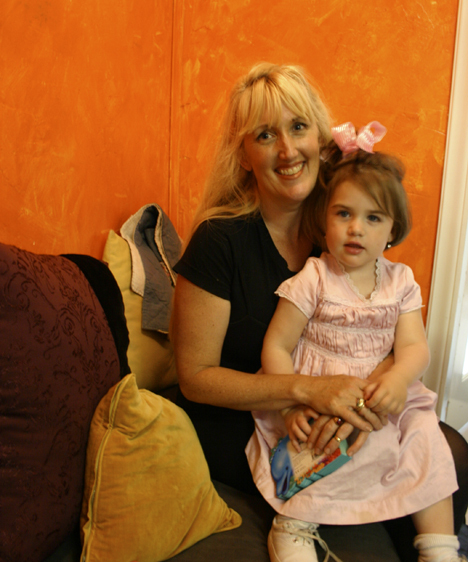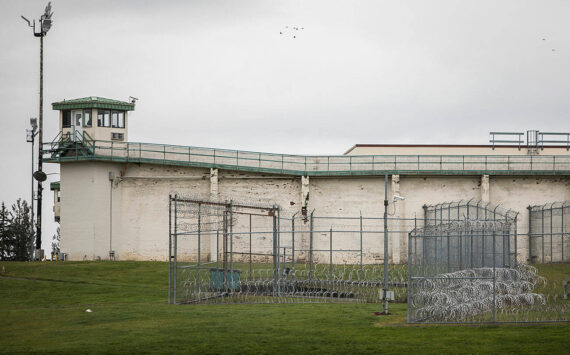Nanette Colby has a work schedule that most single, city-living parents would envy. She owns her own business, Re-Fine Clothier — an upscale boutique located in Middle Floor Merchants in the Theater District — and can be found most days with her two-and-a-half-year-old daughter, Naphtali, (no need for expensive day care). Her commute is short: she lives a few doors down from her business. Her other part-time job at a pool hall on Tacoma Avenue is still within walking distance. And Nanette and Naphtali live in an affordable one-bedroom apartment overlooking downtown Tacoma and Commencement Bay.
The twist: that apartment is in the 12-story, 85-year-old Winthrop Hotel in downtown Tacoma.
Over many years, The Winthrop has earned a mostly notorious reputation. The Tacoma Police Department (TPD) has reported it is the number one location downtown for emergency service providers responding to calls for assistance. The Business Improvement Area (BIA) has reported that one in five downtown incidents that BIA bike patrol officers respond to occur at or near the Winthrop.
But for Colby, 45, and her daughter, it is Home, Sweet Home.
“I haven’t had any bad problems at all,” she said during recent interview at her shop, which looks like a vintage walk-in closet with rows of coats, dresses, and blouses. Antique lamps cast a golden-orange hue on the setting. Colby relaxed on a sofa while Naphtali played with a toy pony. “I know I hear all the bad stories, but nothing bad has happened since I have been there. Not that I’m aware of. I’m pretty much a bragger about the Winthrop because I have the most deluxe and beautiful apartment.”
Many people have quick opinions on what to do with the Winthrop: restore it as an historic hotel; shut it down; or find other housing so residents aren’t concentrated in one location. Last month, Tacoma Housing Authority (THA) announced that it was asked by Prium, the current building owner, if it wanted to purchase the building. THA is expected to make a decision on it this summer.
“It seems like now, with the economy and everything, there’s going to be a hold on any of that stuff for now,” said Colby, referring to development rumors. “Something could come up and something could happen different, but it looks like it’s going to be at least a few years before anything changes.”
What has not been told through local media coverage is the residents’ story. What do some of the people living in the Winthrop think of all the focus on their building? What is it like to live in the Winthrop? What are some of the residents’ perspectives related to the building’s safety and future development?
To that end, the Index recently spoke with Winthrop resident Glenn Grigsby about the many years he has lived in the high-rise apartment building, and Otha Adams, a more recent Winthrop resident, about the two years he has lived in the building. The series continues today with Colby.
Here is what Colby had to say about her life and experience living in the Winthrop.
“The Winthrop was always supposed to be such a scary place.”
I moved to the Winthrop about a year and a half ago. Naphtali was coming and I didn’t want to have to go back to work full-time. I had known about the Winthrop forever because I worked at Sanford and Sons before I had my own business, and I had been a part of the auctions. The Winthrop was always supposed to be such a scary place. This friend of my sister’s lived there. She had come down here [to Middle Floor Merchants] and, just out of curiosity, I asked, ‘Can I see your apartment?’ She said, ‘Sure.’ Not only did she take me to her apartment, but she took me to, like, five apartments of people she knew in there, and they all were like, ‘Oh, yeah, come on in.’ We went down all the hallways, we went on every single floor. It wasn’t filthy. I thought it was going to be a lot different. I thought, ‘Wow.’ The apartments were nice. I thought, ‘Oh, heck, I’ll just sign up for one and see what happens.’ I think it was four or five months later that my apartment came open. I had this little thing in my mind that if it had a nice bath tub, if it had a view, if it had clean carpets, then I would know it was meant to be that I should move there. And it did. It had brand new appliances, brand new carpet and linoleum, a beautiful bath tub, and a view that was amazing. I just knew it was OK. I knew it was going to be great, and it has been.
“This was an opportunity where I didn’t have to go back to the business world and make a ton of money and then leave my daughter in day care.”
I have a small job where I work 12 hours a week up the street at Malarkey’s. That’s my income. Naphtali and I go up there at 5:30 in the morning and I clean for four hours, three times a week. I own a ladies’ second-hand shop. I like to call it a thrift store boutique because it’s upper-end: Nordstrom, Banana Republic, and vintage clothing. I opened it right after Naphtali was born. I thought it would support us. [But] I’m still trying to get my clothing business going. There’s no money to be made here at all. So I got my job at Malarkey’s. My rent is $109 per month. It’s a trade-off. I’ll be 46 years old in a few weeks. To me, I realize, in the big picture, I couldn’t leave Naphtali in day care. So this was an opportunity where I didn’t have to go back to the business world and make a ton of money and then leave my daughter in day care. I wouldn’t be able to run my business if I didn’t live at the Winthrop.
“I think the people who know me would say, ‘Well, Nanette wouldn’t live there if it was icky.'”
I live on the fifth floor in a one-bedroom apartment. I’m in the corner on the outward side, so I have a view of the whole bay. It’s beautiful up there. It is so awesome. I won’t say that I’m friends with my neighbors, but I know them and say hello. I haven’t had any bad problems at all. Nothing. My neighbors are courteous. My view is a $1,000 view. I feel so blessed to be there because I can be with my daughter. I kind of brag about it, like, ‘You guys wouldn’t believe how beautiful my apartment is and I only pay this tiny amount of money.’ I’ve never felt unsafe. When my door is locked, I feel like all is well in the world. I think the people who know me would say, ‘Well, Nanette wouldn’t live there if it was icky.’
“There are a lot of people on Social Security who just don’t have a lot of income.”
I realize there are a lot of calls that come to the Winthrop, such as ambulances or the Fire Department. But the one thing I’ve observed is that most of the people who live there don’t have vehicles. So when they have a medical emergency, they call 911. I think that is one of the reasons there are so many calls. There are a lot of people on Social Security there who just don’t have a lot of income. Also, the Winthrop is kitty-corner from the bus stop. A lot of the activity that is down there, it’s not in front of our building. And then across the street is the grocery store. I can see out my window perfectly who’s down there. There are a couple young gals that go over there and hang out with boys and stuff, and they are loud, but they’re not really doing anything bad. I think the kids want to go hang out where their parents don’t see them and they’re hollering and whooping and they’re saying things they wouldn’t say if their folks were around. I don’t see that has anything to do with the Winthrop.
“Naphtali has those little friendships.”
Naphtali has many people she says hello to each day. It’s so neat. There are so many different characters, really. There is one man there who doesn’t speak much. We call him ‘Yo-Yo Man.’ Every time he sees a child come in, he does his yo-yo. He tells us, ‘I don’t know any tricks, but it helped me quit smoking.’ We come in and say, ‘Hello, Yo-Yo Man.’ There’s a Filipino woman who always remembers Naphtali. When we come in, she always says, ‘Hello, Naphtali. How are you today?’ There’s a German woman up on the ninth floor who has adopted Naphtali as her granddaughter. We call her Omie. So Naphtali has those little friendships. There are animals and pets, too, so she gets to see the dogs go by. For her, it’s really good. I think she really likes it.
“I think that in years past it has been really bad. It’s not like that anymore.”
The manager, Jerry, who just left, was fabulous. If anyone stepped out of line or off the rules, they were evicted immediately. He was so good. He would watch the tapes from the night before and he would call the kids in the office just like he was their dad. I overheard some of the younger people get reprimanded — ‘Who’s that on the tape? Who are you letting in the building?’ It was really buttoned up. I think that in years past it has been really bad. Tacoma Police Officer Jim Pincham would sit in the office with Jerry. I know he’s there, too, to keep everything straight if there are issues. There was one guy they knew who was dealing drugs since I’ve been there. I know Officer Pincham went with Jerry and they went through the apartment. That man is no longer there. Glenn told lots of stories — none of them recent. It’s not like that anymore. I don’t know if all of that has slowed down since the Link light rail cameras were installed. We had Safe Streets over and they told us there’s a camera that films what is going on at the light rail station. There have never been so many children who live at the Winthrop. At the bus stop in the morning, there must be 20 kids out there. It is a different kind of thing than years ago. There are a lot of single mothers just trying to make it.


To read the complete series of interviews with Winthrop Hotel residents, click on the following links:
- A Voice From the Winthrop: Glenn Grigsby (Tacoma Daily Index, June 16, 2009)
- A Voice From the Winthrop: Otha Adams (Tacoma Daily Index, June 26, 2009)
- A Voice From the Winthrop: Nanette Colby (Tacoma Daily Index, July 15, 2009)
- A Voice From the Winthrop: John Heffler (Tacoma Daily Index, July 30, 2009)
- A Voice From the Winthrop: David Allen (Tacoma Daily Index, August 13, 2009)
- A Voice From the Winthrop: David Miller (Tacoma Daily Index, August 20, 2009)
- A Voice From the Winthrop: Kerry Hudson (Tacoma Daily Index, August 27, 2009)
- A Voice From the Winthrop: Jessica Creso (Tacoma Daily Index, September 1, 2009)
Todd Matthews is editor of the Tacoma Daily Index and recipient of an award for Outstanding Achievement in Media from the Washington State Department of Archaeology and Historic Preservation for his work covering historic preservation in Tacoma and Pierce County. He has earned four awards from the Society of Professional Journalists, including third-place honors for his feature article about the University of Washington’s Innocence Project; first-place honors for his feature article about Seattle’s bike messengers; third-place honors for his feature interview with Prison Legal News founder Paul Wright; and second-place honors for his feature article about whistle-blowers in Washington State. His work has also appeared in All About Jazz, City Arts Tacoma, Earshot Jazz, Homeland Security Today, Jazz Steps, Journal of the San Juans, Lynnwood-Mountlake Terrace Enterprise, Prison Legal News, Rain Taxi, Real Change, Seattle Business Monthly, Seattle magazine, Tablet, Washington CEO, Washington Law & Politics, and Washington Free Press. He is a graduate of the University of Washington and holds a bachelor’s degree in communications. His journalism is collected online at wahmee.com.








